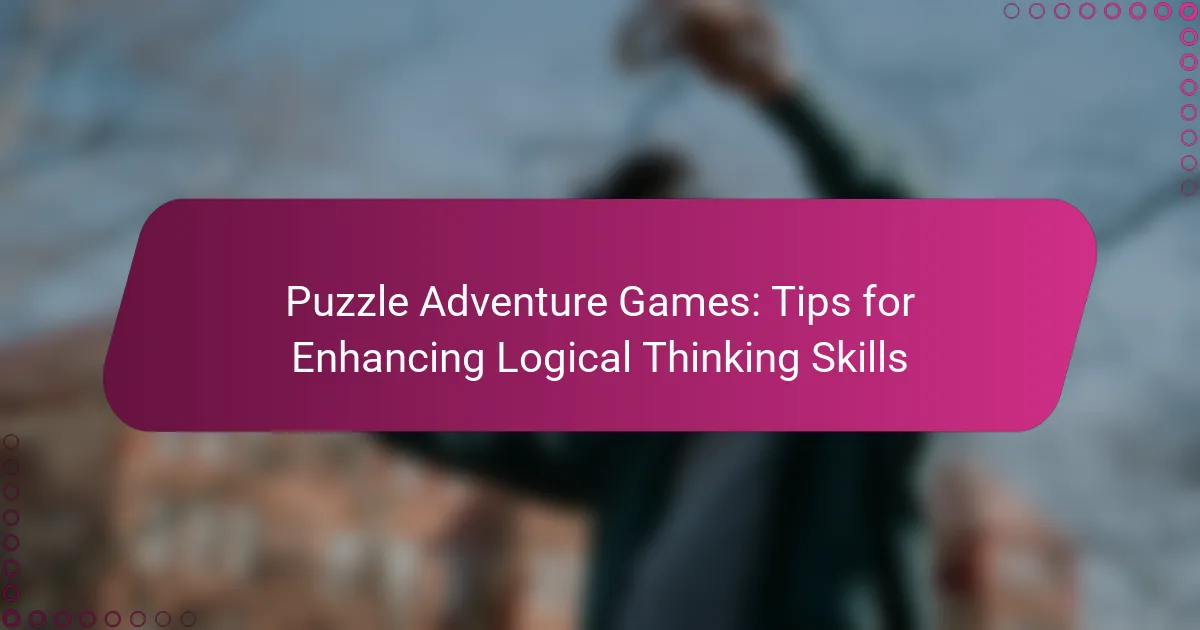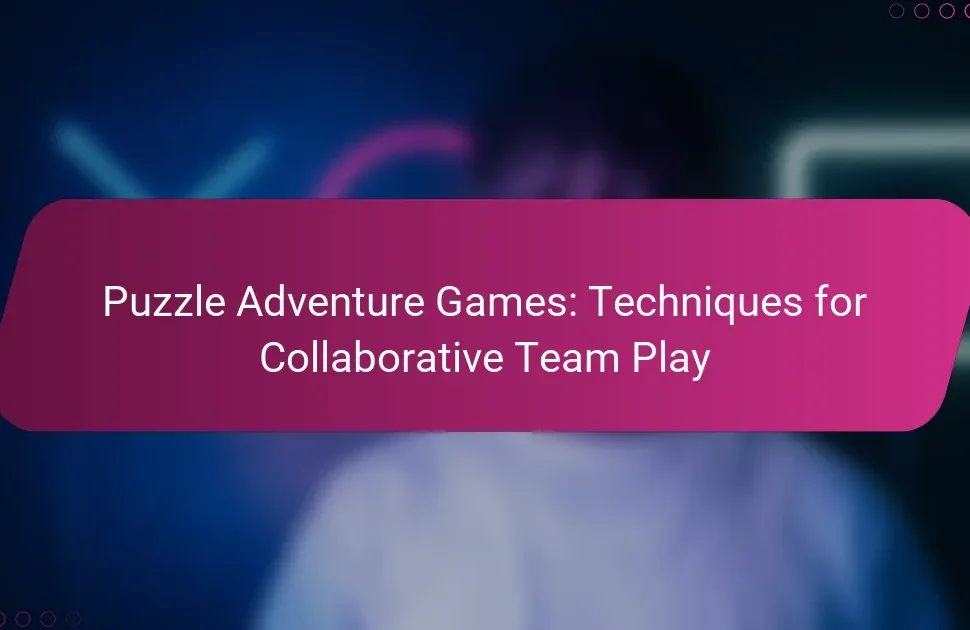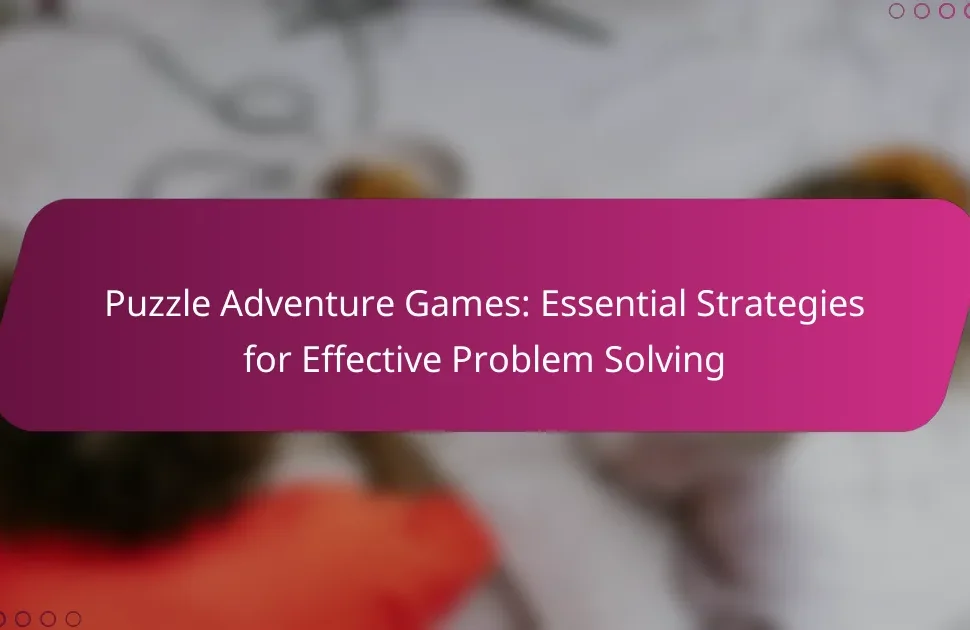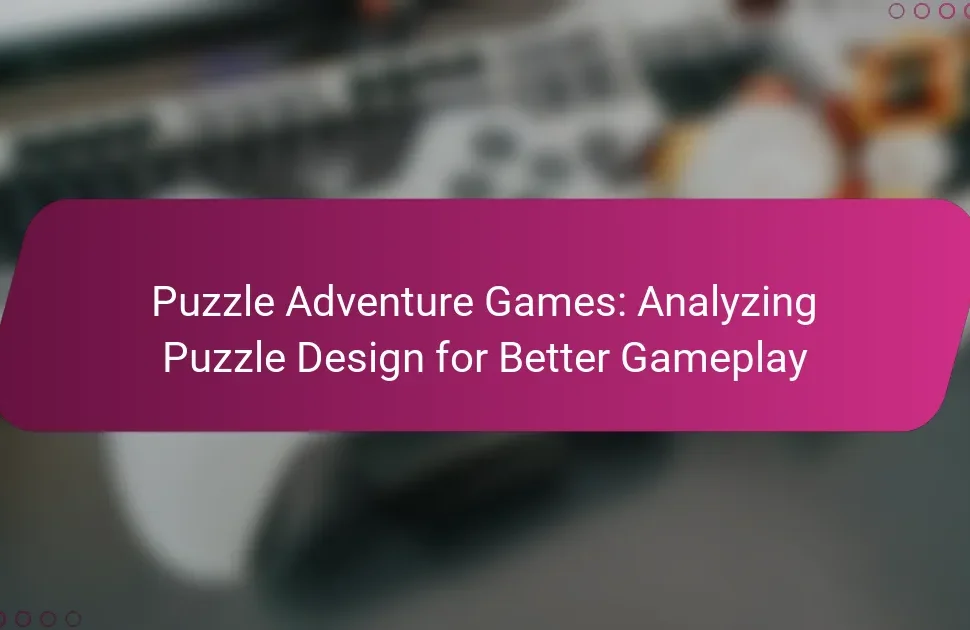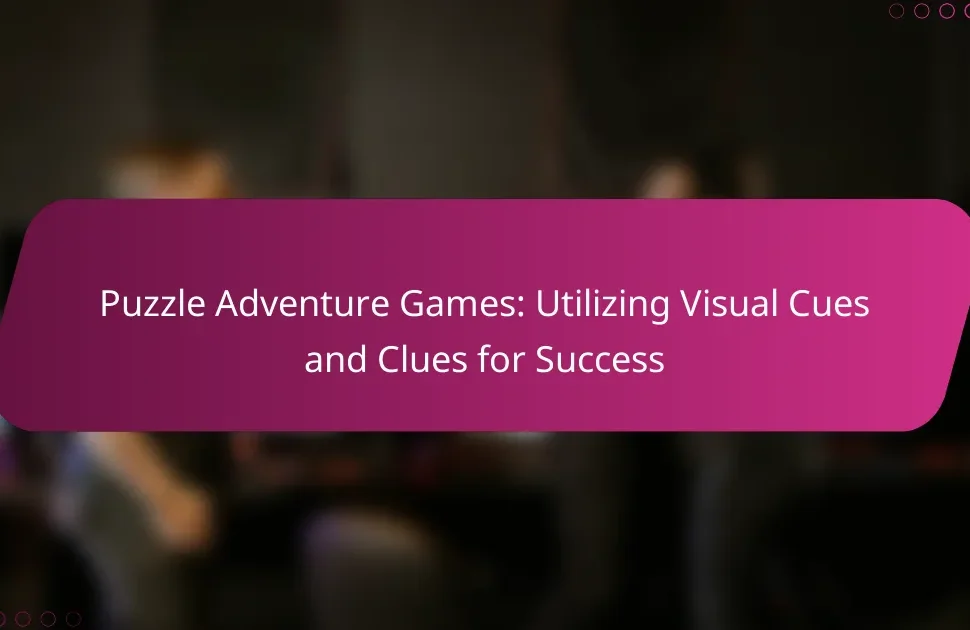Enhancing logical thinking skills is essential for problem-solving and critical analysis. Puzzle adventure games provide intricate challenges that promote pattern recognition and strategic planning. Engaging narratives stimulate decision-making processes, while multiplayer elements improve communication and teamwork. Players can overcome common pitfalls by adopting systematic approaches, ensuring continuous growth in cognitive abilities.
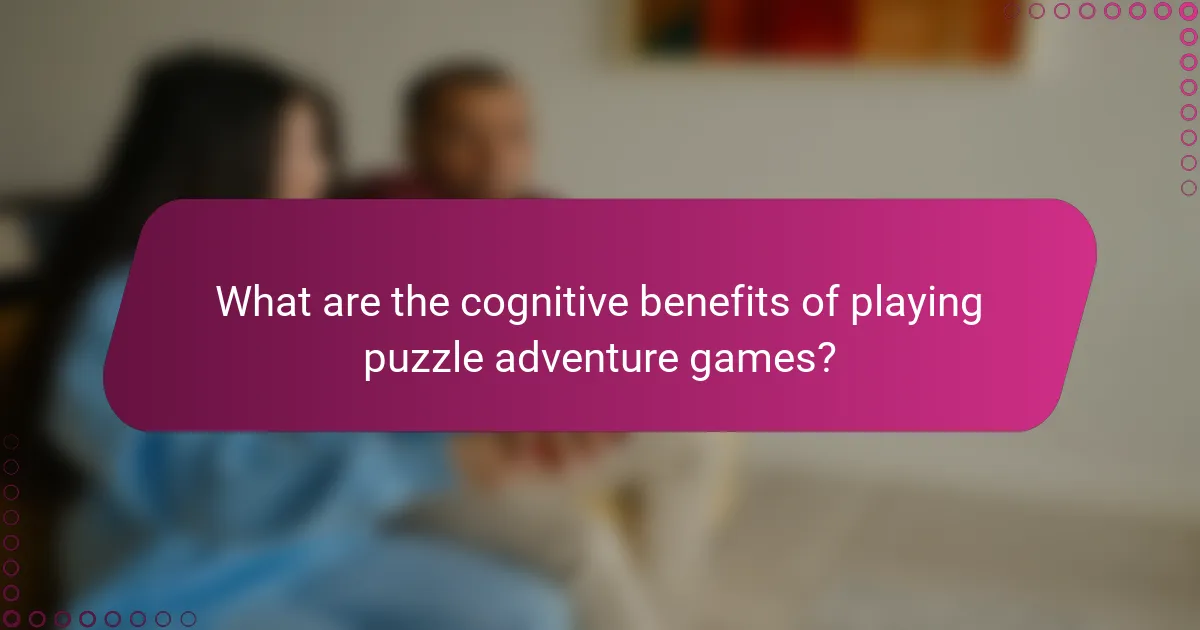
What are the cognitive benefits of playing puzzle adventure games?
Playing puzzle adventure games enhances cognitive skills such as problem-solving, critical thinking, and memory. These games require players to analyse situations, identify patterns, and devise strategies, which sharpens logical reasoning. Engaging with complex narratives and puzzles improves attention to detail and boosts mental agility. As players progress, they develop persistence and patience, essential for tackling challenging tasks.
How do puzzle adventure games enhance problem-solving skills?
Puzzle adventure games enhance problem-solving skills by challenging players to think critically and creatively. These games often require players to analyse situations, identify patterns, and devise strategies to progress. Engaging with complex puzzles fosters logical reasoning and improves cognitive flexibility.
Additionally, players learn to approach problems from multiple angles, which is essential for effective problem-solving. The immersive environments of these games create a sense of urgency and encourage quick thinking. As a result, players develop resilience and adaptability when facing obstacles.
Overall, puzzle adventure games serve as a valuable tool for enhancing logical thinking and problem-solving abilities through interactive and engaging gameplay.
Why are critical thinking and logical reasoning important in gameplay?
Critical thinking and logical reasoning are essential in gameplay as they enhance problem-solving skills. Players navigate complex puzzles, requiring them to analyse situations, draw conclusions, and make informed decisions. These skills lead to improved game performance and a deeper understanding of game mechanics. Additionally, engaging with puzzles fosters cognitive flexibility, enabling players to adapt strategies and think creatively. Overall, these skills contribute significantly to a rewarding gaming experience.
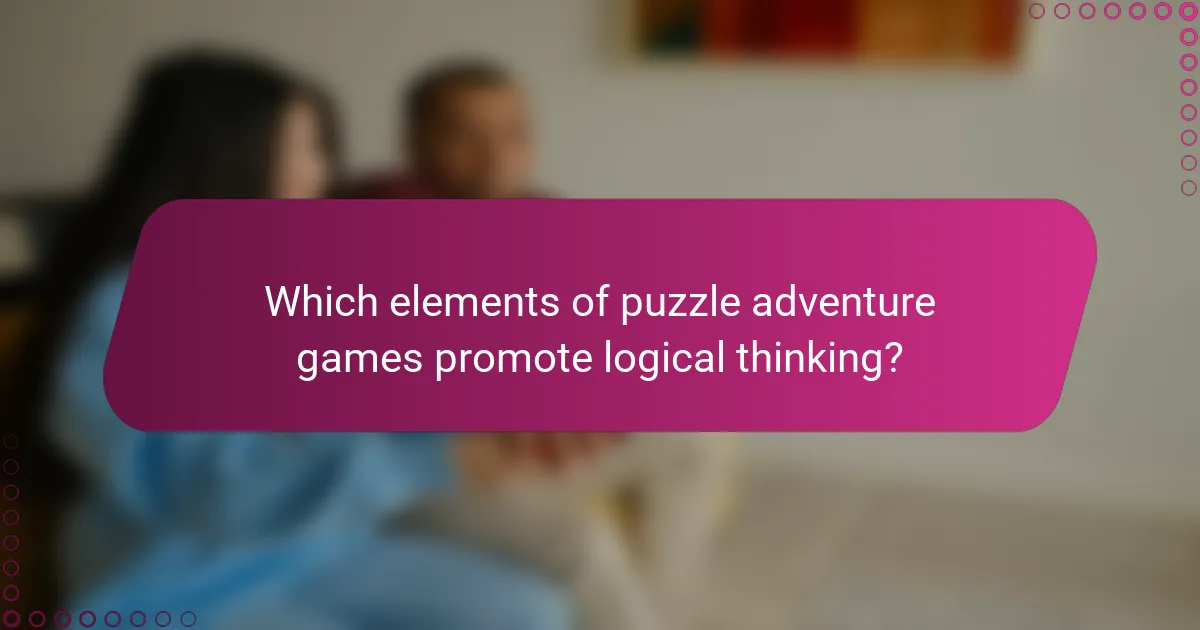
Which elements of puzzle adventure games promote logical thinking?
Puzzle adventure games promote logical thinking through problem-solving challenges, pattern recognition, and strategic planning.
Key elements include intricate puzzles that require players to analyse clues, make connections, and devise solutions. The game mechanics often encourage exploration and experimentation, fostering critical thinking. Additionally, narrative elements can present dilemmas that stimulate decision-making processes, enhancing cognitive flexibility.
Moreover, the collaboration aspect in multiplayer puzzle games can improve communication skills and teamwork, further contributing to logical reasoning development. Overall, these elements create an engaging environment that sharpens players’ logical thinking abilities.
How do game mechanics influence cognitive development?
Puzzle adventure games significantly enhance cognitive development by promoting logical thinking skills. These games often require players to solve complex puzzles, which fosters critical thinking and problem-solving abilities.
Engaging with puzzle mechanics encourages players to analyse situations, identify patterns, and develop strategies. For example, players must often deduce the correct sequence of actions to progress, reinforcing their analytical skills.
Additionally, these games typically involve time management and resource allocation, which further sharpens decision-making skills. Players learn to weigh options and anticipate consequences, enhancing their overall cognitive flexibility.
Finally, the immersive nature of puzzle adventure games can improve memory retention. Players must remember clues and previous actions, which aids in reinforcing memory pathways and cognitive recall.
What role do narrative and storytelling play in enhancing engagement?
Narrative and storytelling significantly enhance engagement in puzzle adventure games by immersing players in compelling plots. They create emotional connections, driving players to solve challenges to progress the story. A well-crafted narrative can motivate players to think critically and logically, as they seek solutions that align with the storyline. Additionally, storytelling provides context for puzzles, making them more meaningful and memorable. Engaging narratives can also encourage players to explore the game world thoroughly, enhancing their overall experience and logical thinking skills.
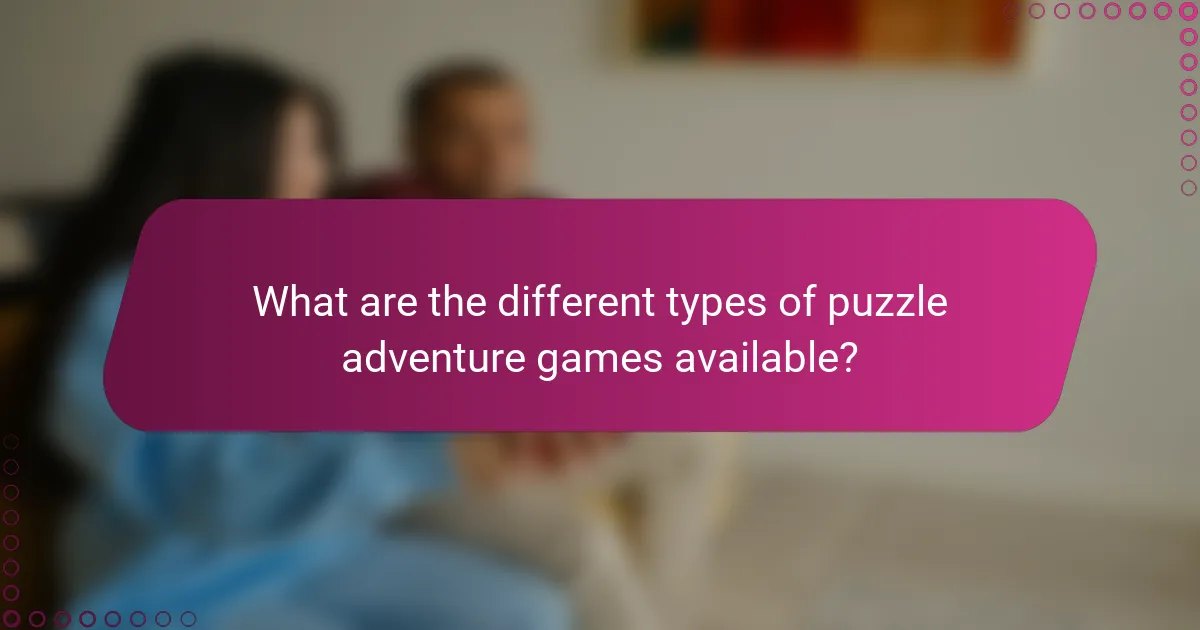
What are the different types of puzzle adventure games available?
Puzzle adventure games come in various types, each offering unique experiences. Common types include escape room games, narrative-driven puzzles, platforming puzzles, and mystery-solving adventures. Escape room games challenge players to solve puzzles under time constraints, while narrative-driven puzzles focus on story and character development. Platforming puzzles often combine physical challenges with logical reasoning, and mystery-solving adventures immerse players in complex plots requiring critical thinking. Each type enhances logical thinking skills through different gameplay mechanics and challenges.
How do casual and hardcore puzzle adventure games differ in complexity?
Casual puzzle adventure games tend to have simpler mechanics and lower difficulty levels compared to hardcore puzzle adventure games, which often feature intricate puzzles and complex narratives. Casual games prioritise accessibility, while hardcore games challenge players’ logical thinking and problem-solving skills. Casual games may offer quicker rewards, whereas hardcore games require sustained effort and strategic planning. This distinction enhances players’ logical thinking skills through varying levels of engagement and complexity.
Which popular puzzle adventure games are known for their logical challenges?
Popular puzzle adventure games known for their logical challenges include “The Witness,” “Portal,” “Braid,” and “Myst.” These games emphasise critical thinking and problem-solving skills through intricate puzzles and immersive narratives. Each game offers unique challenges that enhance logical reasoning, making them favourites among players seeking mental stimulation.
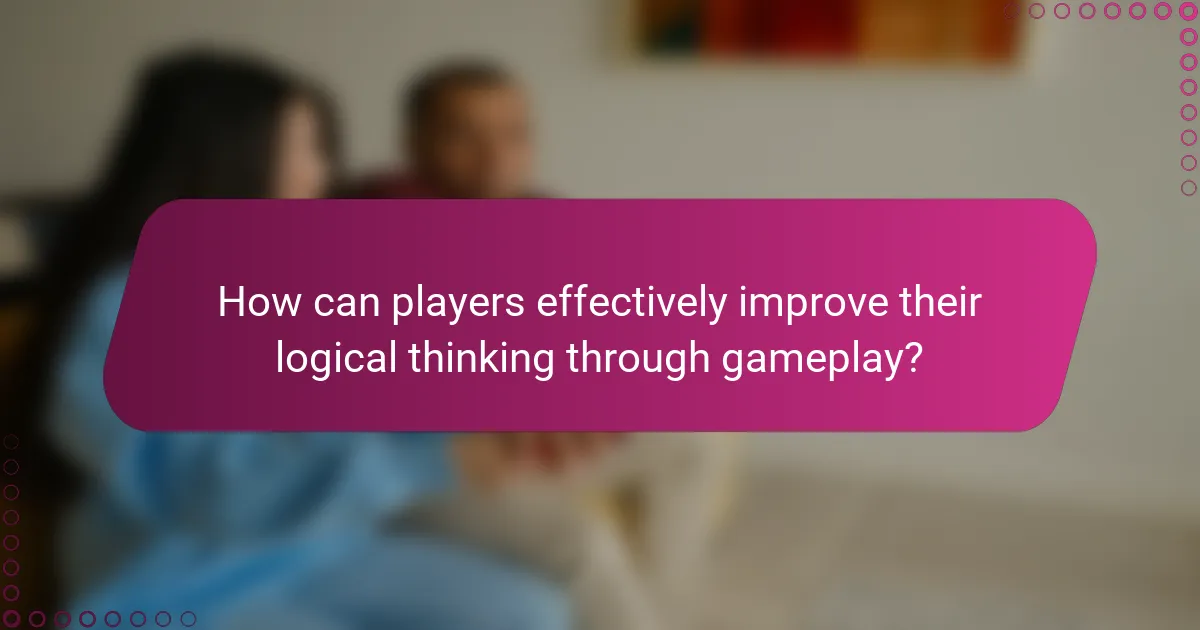
How can players effectively improve their logical thinking through gameplay?
Players can enhance logical thinking through puzzle adventure games by engaging with complex challenges and strategic problem-solving. These games require players to analyse situations, recognise patterns, and apply deductive reasoning.
Incorporating a variety of puzzles promotes diverse cognitive skills. For example, spatial puzzles improve visual reasoning, while riddles enhance verbal logic. Regular gameplay can lead to improved mental agility and adaptability in real-life scenarios.
Choosing games with escalating difficulty ensures continuous growth. Players should seek titles that introduce new mechanics and require innovative thinking to solve increasingly complex problems. This gradual increase in challenge fosters resilience and critical thinking.
Collaborative gameplay can further enhance logical thinking. Working with others encourages discussion and the sharing of different perspectives, enriching the problem-solving process and leading to a deeper understanding of logical concepts.
What strategies can be used to tackle challenging puzzles?
To tackle challenging puzzles in puzzle adventure games, players can employ several effective strategies. First, break down the puzzle into smaller components to simplify problem-solving. Second, observe patterns and clues within the game environment to gain insights. Third, collaborate with other players for diverse perspectives and solutions. Fourth, practice logical reasoning through regular gameplay to enhance skills over time. Lastly, maintain patience and persistence, as some puzzles require time to solve.
How does collaboration with others enhance logical thinking skills?
Collaboration with others significantly enhances logical thinking skills by promoting diverse perspectives and problem-solving approaches. Engaging with teammates in puzzle adventure games encourages communication and critical analysis, allowing players to share insights and strategies. This interaction fosters a deeper understanding of logical concepts, as players must articulate their reasoning and consider alternative viewpoints. As a result, collaborative gameplay not only sharpens individual skills but also strengthens group dynamics, leading to more effective problem-solving outcomes.
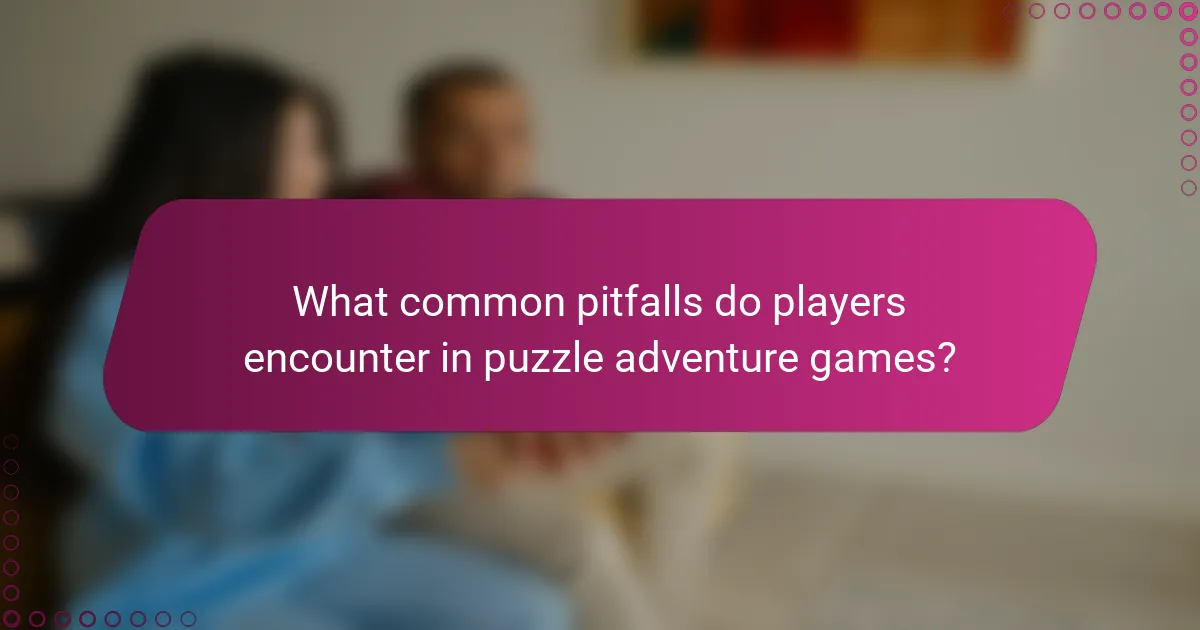
What common pitfalls do players encounter in puzzle adventure games?
Players in puzzle adventure games often face pitfalls such as overthinking solutions, missing clues, and becoming frustrated with difficult puzzles. These challenges can hinder logical thinking development. To overcome these, players should adopt a systematic approach, break puzzles into smaller parts, and maintain a positive mindset. Recognising these common issues can enhance their gaming experience and improve problem-solving skills.
How can frustration impact logical reasoning during gameplay?
Frustration can diminish logical reasoning during gameplay by impairing focus and decision-making. When players encounter challenging puzzles, heightened frustration may lead to impulsive choices rather than thoughtful analysis. This emotional state disrupts the cognitive processes essential for effective problem-solving, resulting in decreased performance. Managing frustration through breaks or positive reinforcement can enhance logical thinking and gameplay experience.
What are the signs of cognitive overload when playing?
Cognitive overload in puzzle adventure games is indicated by frustration, reduced problem-solving ability, and difficulty focusing. Players may experience fatigue, confusion, and a sense of being overwhelmed. These signs suggest the need for breaks to enhance logical thinking skills and maintain engagement.
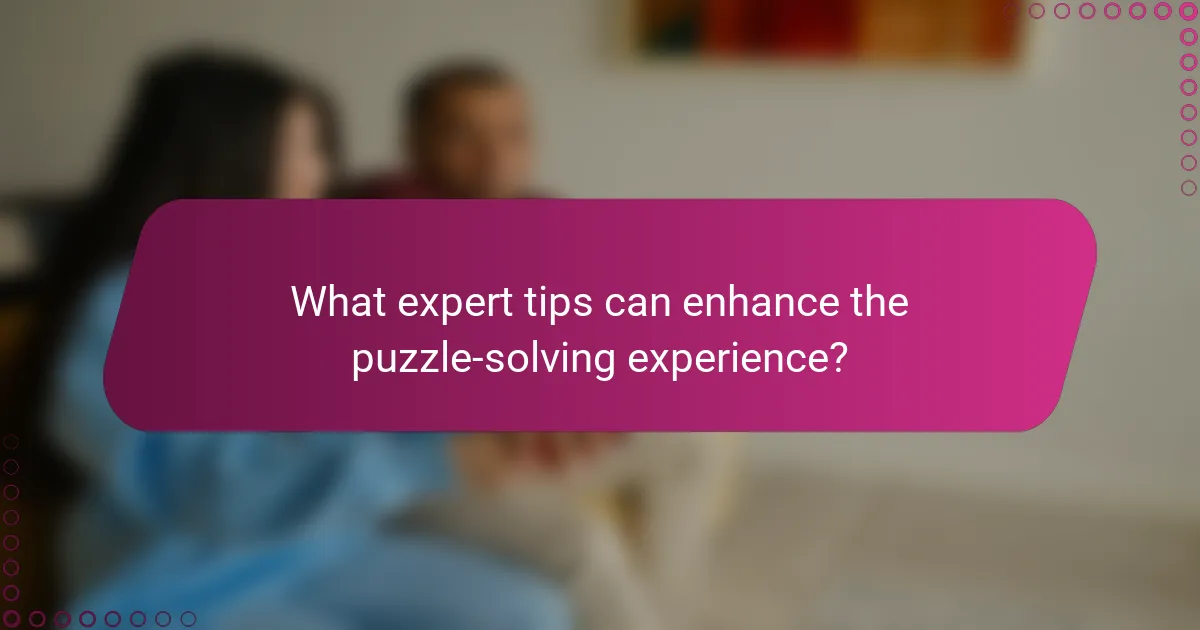
What expert tips can enhance the puzzle-solving experience?
Engaging with puzzle adventure games enhances logical thinking skills through strategic approaches. Focus on breaking down complex puzzles into manageable parts.
1. Analyse the environment for clues and patterns.
2. Collaborate with others to gain diverse perspectives.
3. Practice regularly to improve problem-solving speed.
4. Stay patient and persistent; frustration can hinder progress.
How can players balance challenge and enjoyment in their gaming experience?
Players can balance challenge and enjoyment in puzzle adventure games by setting personal goals and adjusting difficulty levels. Start by selecting games that offer adjustable settings to tailor the experience. Incorporate breaks to prevent frustration and maintain engagement. Collaborate with others for shared problem-solving, enhancing enjoyment through social interaction. Focus on mastering skills gradually to build confidence and sustain interest.
What resources are available for players seeking to improve their logical skills?
Players seeking to improve their logical skills can utilise various resources within puzzle adventure games. Engaging with diverse puzzles enhances critical thinking and problem-solving abilities.
1. Online tutorials provide strategies for tackling specific game challenges.
2. Community forums allow players to share tips and solutions, fostering collaboration.
3. Game guides often include walkthroughs that detail logical approaches to puzzles.
4. Mobile apps offer brain-training exercises designed to sharpen logical reasoning.
5. YouTube channels feature gameplay videos that demonstrate effective problem-solving techniques.
6. Books on logic and puzzles can provide theoretical knowledge to complement practical experience.
